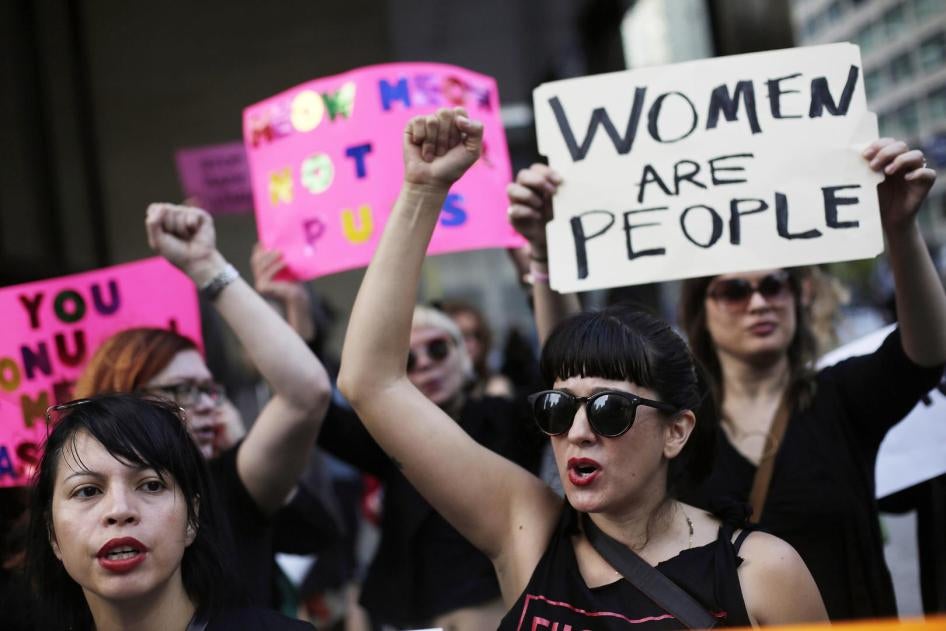As leaders around the world celebrate women’s achievements this month, it’s worth examining the year in sexist speech by politicians. The last 12 months, sadly, help put to rest any claims that sexism, even at the highest levels, is a thing of the past. And while U.S. president Donald Trump drew most of the attention for his often sexist rhetoric as he pursued the White House, he has by no means cornered the market on the antiquated practice as the following chronicle demonstrates.
Just last month, South African AmaXhosa King Mpendulo Zwelonke Sigcawu declared that the country is not ready for a female leader, saying, “The country’s problems have overwhelmed leaders who are men‚ how much more for a woman,” to the amusement of male bystanders.
Others question whether women have a place outside the home at all. Nigerian president Muhammadu Buhari dismissed his wife’s political acumen after she criticized his leadership in October, saying that she “belongs to my kitchen and my living room.” In a June 2016 speech, Turkish President Recep Tayyip Erdogan likened a childless woman to “half a person” and said, “A women who rejects motherhood, who refrains from being around the house, however successful her working life is, is deficient, is incomplete.”
Russian Senator Vitaly Milonov echoed Erdogan in October, calling women who terminate pregnancies “empty-headed ladies” and saying, “The fact that she is a successful businesswoman, manager, is irrelevant. The relevant is being a mother.”
When five female airport guards in Kandahar, Afghanistan were gunned down on their way to work in December, a provincial council member said in a Facebook post, “Women should stay in their homes with hijab and dignity, a valued [position] that God has given them.”
In August, Brazil’s health minister Ricardo Barros said that “men work harder than women,” leaving them less time to look after their health.
And in the U.S. in February, a Republican party leader in Utah wrote a letter opposing a wage-equality bill because men “need to make enough to support their families and allow the Mother [his capitalization] to remain in the home to raise and nurture the children.” Last week, a European Parliament member, Janusz Korwin-Mikke, asserted that “women must earn less than men because they are weaker, they are smaller, they are less intelligent.”
Other leaders behave as if sexual violence is acceptable, or even funny. At a campaign rally in April 2016, then-mayor of Davao City, Rodrigo Duterte, who won the Philippine presidency, lamented the historical rape of an Australian missionary, saying, “But she was so beautiful, the mayor should have been first. What a waste.”
A former Dubai police chief took to Twitter last month to cite what he called a “Swedish proverb”: “When a woman says no, she really means to say yes.” (Sweden quickly stepped in to say that the country has no such proverb, and “no means no.“)
Such commentary is not solely reserved for male politicians. Pushing for Russia’s decriminalization of some forms of domestic abuse, Senator Yelena Mizulina said that “a man beating his wife is less offensive than when a woman humiliates a man.”
Some political leaders even spring to the defense of others’ sexist remarks. When video emerged of Donald Trump claiming to use his power and influence to grab women “by the pussy,” the U.K. Independence Party (UKIP) and Brexit leader Nigel Farage excused the comments as “alpha male boasting,” saying, “It’s the kind of thing, if we are being honest, that men do.”
Russian President Vladimir Putin made light of disputed allegations that Trump had hired sex workers on a Moscow visit, joking at the women’s expense, “I can hardly believe that he ran off to meet with our girls of low social morals. Although, of course, ours are the best in the world.”
Female politicians are also the targets of direct attack. In October, a candidate for UKIP leadership tweeted a request to silence Scottish Prime Minister Nicola Sturgeon by taping her mouth shut, adding, “And her legs, so she can’t reproduce.”
Many women in politics say that harassment and sexist commentary are par for the course. Even in Canada, where Prime Minister Justin Trudeau is lauded for his feminism, MP Michelle Rempel wrote of blatant sexism in Parliament last April, citing instances when a male colleague implored her to talk about issues when she was “less emotional,” and when another male parliamentarian responded to a request from her by saying, “It turns me on when you’re direct.”
In South Africa, a male MP yelled a term for “sex worker” at a female colleague as she took the floor in February, and another female MP was subjected to cat noises while speaking, which some news outlets called a parliamentary “tradition.”
And what awaits those who attempt to fight back against sexism on the political stage? More sexism and harassment. In May, when French female MPs said they could no longer stay silent about the scale of the abuse they withstand, “right-wing male MPs began loudly jeering ‘aaaw’ as if to a child.”
Such brazen sexism shows that nowhere in the world have we come as far as we thought – or hoped – on equality, or even human decency.
But we cannot allow the quotidian nature of sexist remarks numb us to their effects, especially when they come from the mouths (or tweets) of political leaders. As British MP and shadow home secretary Diane Abbott recently warned, constant abuse makes “other women look at how those of us in the public space are treated and think twice about speaking up publicly, let alone getting involved in political activity.”
Even International Women’s Day this year featured sexist leaders. Brazilian President Michel Temer praised women’s ability at “pointing out unbalances in supermarket prices.” Former deputy prime minister Michael Heseltine said U.K. Prime Minister Theresa May has “a man-size job.”
When politicians give voice to the ugliest forms of sexism, it is especially important to fight back. What does it say that so many in leadership roles can show public displays of sexism with few, if any, lasting repercussions?
Don’t let politicians’ photo opportunities during this month of honoring women replace a commitment to gender equality and women’s rights during the other 12 months of the year. They can begin by stopping their own sexist language in politics, and demanding the same of leaders everywhere, of all political parties, from city councillor to prime minister, and everyone in between.










